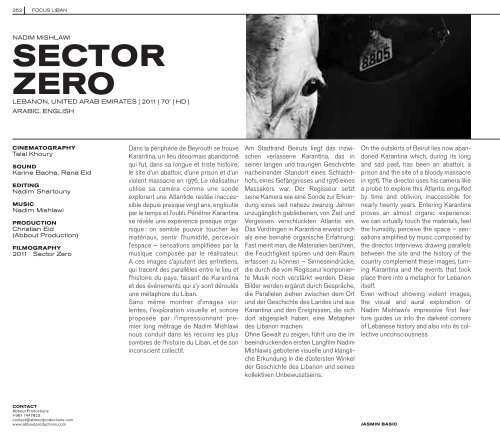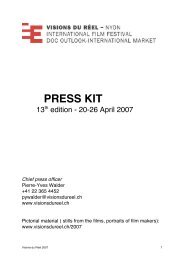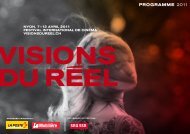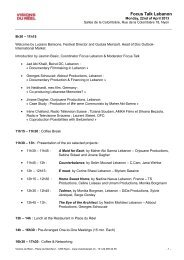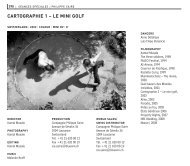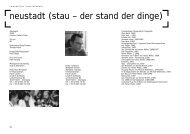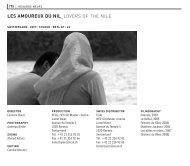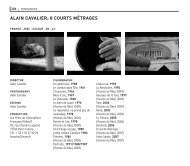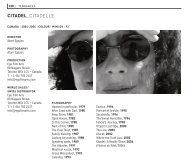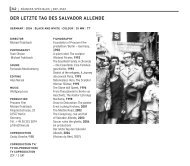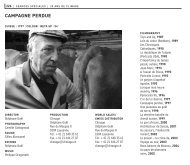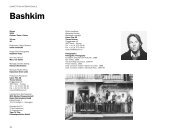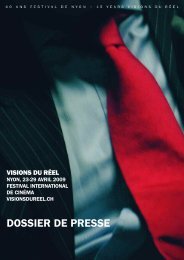Katalog 2013.pdf - Visions du Réel
Katalog 2013.pdf - Visions du Réel
Katalog 2013.pdf - Visions du Réel
You also want an ePaper? Increase the reach of your titles
YUMPU automatically turns print PDFs into web optimized ePapers that Google loves.
252 focus liban<br />
Nadim Mishlawi<br />
Sector<br />
Zero<br />
Lebanon, United Arab Emirates | 2011 | 70’ | HD |<br />
Arabic, English<br />
Cinematography<br />
Talal Khoury<br />
Sound<br />
Karine Bacha, Rana Eid<br />
Editing<br />
Nadim Shartouny<br />
Music<br />
Nadim Mishlawi<br />
Pro<strong>du</strong>ction<br />
Christian Eid<br />
(Abbout Pro<strong>du</strong>ction)<br />
Filmography<br />
2011 Sector Zero<br />
Dans la périphérie de Beyrouth se trouve<br />
Karantina, un lieu désormais abandonné<br />
qui fut, dans sa longue et triste histoire,<br />
le site d’un abattoir, d’une prison et d’un<br />
violent massacre en 1976. Le réalisateur<br />
utilise sa caméra comme une sonde<br />
explorant une Atlantide restée inaccessible<br />
depuis presque vingt ans, engloutie<br />
par le temps et l’oubli. Pénétrer Karantina<br />
se révèle une expérience presque organique<br />
: on semble pouvoir toucher les<br />
matériaux, sentir l’humidité, percevoir<br />
l’espace – sensations amplifiées par la<br />
musique composée par le réalisateur.<br />
A ces images s’ajoutent des entretiens,<br />
qui tracent des parallèles entre le lieu et<br />
l’histoire <strong>du</strong> pays, faisant de Karantina<br />
et des événements qui s’y sont déroulés<br />
une métaphore <strong>du</strong> Liban.<br />
Sans même montrer d’images violentes,<br />
l’exploration visuelle et sonore<br />
proposée par l’impressionnant premier<br />
long métrage de Nadim Mishlawi<br />
nous con<strong>du</strong>it dans les recoins les plus<br />
sombres de l’histoire <strong>du</strong> Liban, et de son<br />
inconscient collectif.<br />
Am Stadtrand Beiruts liegt das inzwischen<br />
verlassene Karantina, das in<br />
seiner langen und traurigen Geschichte<br />
nacheinander Standort eines Schlachthofs,<br />
eines Gefängnisses und 1976 eines<br />
Massakers war. Der Regisseur setzt<br />
seine Kamera wie eine Sonde zur Erkun<strong>du</strong>ng<br />
eines seit nahezu zwanzig Jahren<br />
unzugänglich gebliebenen, von Zeit und<br />
Vergessen verschluckten Atlantis ein.<br />
Das Vordringen in Karantina erweist sich<br />
als eine beinahe organische Erfahrung:<br />
Fast meint man, die Materialien berühren,<br />
die Feuchtigkeit spüren und den Raum<br />
erfassen zu können – Sinneseindrücke,<br />
die <strong>du</strong>rch die vom Regisseur komponierte<br />
Musik noch verstärkt werden. Diese<br />
Bilder werden ergänzt <strong>du</strong>rch Gespräche,<br />
die Parallelen ziehen zwischen dem Ort<br />
und der Geschichte des Landes und aus<br />
Karantina und den Ereignissen, die sich<br />
dort abgespielt haben, eine Metapher<br />
des Libanon machen.<br />
Ohne Gewalt zu zeigen, führt uns die im<br />
beeindruckenden ersten Langfilm Nadim<br />
Mishlawis gebotene visuelle und klangliche<br />
Erkun<strong>du</strong>ng in die düstersten Winkel<br />
der Geschichte des Libanon und seines<br />
kollektiven Unbewusstseins.<br />
On the outskirts of Beirut lies now abandoned<br />
Karantina which, <strong>du</strong>ring its long<br />
and sad past, has been an abattoir, a<br />
prison and the site of a bloody massacre<br />
in 1976. The director uses his camera like<br />
a probe to explore this Atlantis engulfed<br />
by time and oblivion, inaccessible for<br />
nearly twenty years. Entering Karantina<br />
proves an almost organic experience:<br />
we can virtually touch the materials, feel<br />
the humidity, perceive the space – sensations<br />
amplified by music composed by<br />
the director. Interviews drawing parallels<br />
between the site and the history of the<br />
country complement these images, turning<br />
Karantina and the events that took<br />
place there into a metaphor for Lebanon<br />
itself.<br />
Even without showing violent images,<br />
the visual and aural exploration of<br />
Nadim Mishlawi’s impressive first feature<br />
guides us into the darkest corners<br />
of Lebanese history and also into its collective<br />
unconsciousness.<br />
Contact<br />
Abbout Pro<strong>du</strong>ctions<br />
+961 1447823<br />
contact@abboutpro<strong>du</strong>ctions.com<br />
www.abboutpro<strong>du</strong>ctions.com<br />
Jasmin Basic


